- Home
- Warwick Deeping
Apples of Gold Page 2
Apples of Gold Read online
Page 2
The house was very old, built of timber and plaster, with queer little blinking windows, and two tall octagonal chimneys rising out of its roof. A shaggy thorn hedge surrounded the garden, which was badly kept, being a waste of grass and fruit trees and unpruned roses, a green and tangled place with the grass standing as high as a man's knees. A brick path, full of weeds, led up to the oak door, and on either side of the door a yew tree stood stiff and solemn.
The house, too, was solemn, and severely sad. In the badly lit oak-panelled parlour a number of people were assembled, people who wore black, and whose faces made Jordan think that he was in church. A thin man with a long and compressed face was seated in a chair. He had a very high forehead, a hooked nose, and pale eyes that never changed their expression.
The Nandos spoke very kindly to him.
"Mr. Sylvester, I could not sleep for thinking of your loss."
"It is very hard, my friend, very hard."
Mr. St. Croix's face seemed to grow more cold and severe.
"Shall I question the ways of the Almighty?" he asked.
Jordan was staring at him, and Mr. St. Croix's eyes suddenly met the boy's.
"Who is this?"
"This is Jordan," said Mrs. Mary.
The man in the chair frowned. There was something disapproving in his eyes, a look of displeased pity. Jordan felt that Mr. St. Croix did not like him, though what he had done to deserve that dislike he did not know.
"Poor child!" said the Frenchman.
Jordan saw Mrs. Mary colour up, and a swift light came into her brown eyes. She put her arm over Jordan's shoulders, and, drawing him to the window, sat down in the window-seat. Jordan leaned against her knees and looked up into her face.
"Why did the man call me a poor child, mother? We are not poor, are we?"
She bent down and whispered:
"No, my dear, but Mr. St. Croix is unhappy."
"Why is he unhappy?"
"Because Mrs. St. Croix died just a week ago."
Presently a woman came into the room with a baby in her arms. The people gathered round and began to make a fuss of the child, though Sylvester St. Croix continued to sit in his chair with an air of cold and severe detachment. Mrs. Mary took the baby in her arms, and talked mother nonsense to it.
Jordan, standing by, asked to be allowed to hold the child.
"Why, to be sure; be very careful, Dan."
Jordan was very solemn and very careful.
"Why, it's got red hair," he said.
"Yes, my dear."
"Isn't it ugly!"
"Tsh, tsh!" said several voices.
"But I like it," quoth he; "what's its name?"
"She is going to be called Douce Jeanne."
"What does Douce mean?"
"'Gentle,' my dear."
Jordan kissed Miss St. Croix, and the baby began to cry. She was taken quickly out of his arms, and Jordan, feeling a little hurt, turned about and found Mr. St. Croix's eyes fixed on him with an expression of angry disapproval.
"Why does he look at me like that?" the boy wondered.
On the way home he asked Mrs. Mary the same question, but Mrs. Mary put him off.
When he was ten, Jordan was sent to a school kept by Mr. Peregrine in an old house on the way to St. Giles'-in-the-Fields. Nando's fencing-school had increased its reputation, and Mary and her man were determined that the boy should know his Latin and Greek as well as any gentleman. Jordan trudged off each morning with his strap of books, after a breakfast of small beer, bread and bacon, and a kiss from Mrs. Mary. He had ceased to be kissed by sentimental Meg; his dignity had grown beyond it.
He was not a bookish boy, and it may be that he learnt more from his fights and his friendships than from Mr. Peregrine and his two ushers, but at the age of twelve he had a piece of knowledge forced upon him which he was never to forget. One May day, in the dinner-hour, he had a battle with a boy a year older than himself, an evil lout, the son of a brewer in the city. Jordan beat the brewer's son, but his victory left him cold.
About five o'clock he walked into the fencing-school, where the last gentlemen were putting on their coats. Nando was polishing a foil, and Jordan walked straight up to him. He had a split lip and a lump on his forehead.
"Father."
Nando looked at him, and something in his man's love for the lad was challenged by the boy's serious face.
"Hallo, Dan! What, another fight?"
"I beat Bob Dunnage—I beat him till he howled. He called me a bastard."
Straightway, Nando put down the foil, and taking Jordan by the shoulder led him out of the fencing-school and into the parlour. It was empty, and Thomas Nando closed the door, saying within himself, "I ought to have told him before."
"Lad," he said, "I want to talk to you."
He sat down in his leather chair and took Jordan on his knee. The boy's frank eyes looked at him with steady seriousness.
"Why did Dunnage call me a bastard?"
"Dan," said Nando, with his hands on the boy's shoulders, "God forgive me, but I ought to have told you of this before."
Very gently he told Jordan the truth, and never in his life had Jordan seen this man so moved. He sat solemnly on Thomas Nando's knee, a little pucker of a frown on his forehead, his young eyes strangely grim. There was no quivering of his mouth. He stared steadily out of the window.
"So you are not my father?"
"No, Dan, save that——"
"And mother is not my mother?"
"By God, boy, but she is—in everything that matters. She loves you better than she loves herself."
And suddenly the boy clasped him about the neck, and Nando's arms went round him and held him very firmly.
"There, there, old lad, you are a real son to us, and we're proud of you, mighty proud."
In a little while Jordan sat up very straight and grave.
"I'll call you father—still."
"Of course."
"And mother."
"And mother."
Jordan smiled faintly.
"It seems, father, that I owe you more than if I'd been a real son."
"God forgive me," said Nando, "but mother herself could not have given me a son more after my own heart."
III
Jordan March was fifteen when Thomas Nando—a little plumper in the chin and richer in the pocket—took to planting his philosophy of life in a garden not very far from the house of Sylvester St. Croix. It was a pretty parcel of ground shut in by a high thorn-hedge, with a gardener's cottage in the centre of it. There were nut alleys and grass walks, a summer-house in a circle of pollarded limes, a small pool stocked with fish, a little orchard, and flower and herb beds edged with box. On Sunday afternoons Tom Nando and Mrs. Mary would walk out to their garden, Jordan going with them and carrying a basket which might contain a chicken and a bottle of wine. They would spend the rest of the Sunday in this pleasant place, Mary Nando happy as a brown thrush, while her man took his coat off and hung his wig in an apple tree. They supped in the gardener's cottage, the man's wife waiting on them, and towards dusk they would start back for Spaniards Court, the supper basket packed with lettuces, strawberries, green peas or whatever was in season. Mrs. Mary always had her posy of flowers, which she put into water immediately on reaching home.
Thomas Nando's pleasures were of the simplest, for, loving his art as he did, he respected his body and kept it as clean as his sword. Twice a week he spent an hour at Mills's coffee-house, but his garden drew him more and more, and he would stroll across the fields on summer evenings, taking Jordan with him. Once a month the Nandos visited Sylvester St. Croix, but Jordan was not of the party, for though Mrs. Mary was Douce's godmother, she had made up her mind that Jordan should not enter Sylvester's house. She had never forgiven him for the way he had looked at the boy on the day of Douce's christening.
One summer evening, however, when Nando and Jordan were raking up the grass which the gardener had scythed, they heard the gate-bell rin
g. The oak gate was kept locked, and though Nando had unlocked it he had left the padlock clipped on the chain.
"Go and see who is there, Dan."
Jordan went. He had thrown off his coat and vest, and had his sleeves rolled up, and even at the age of fifteen he was as big as most men. Women thought him a very handsome lad, with his grey eyes, white teeth, and his air of smiling aloofness. He had a dignity of his own, the inwardness of which had begun to develop on the day young Dunnage had taunted him with harsh truth.
Outside the gate he found a tall man in black holding a little girl by the hand—Mr. Sylvester St. Croix and his daughter.
Jordan smiled.
"Mr. Nando is in the garden."
He stood aside, holding the gate open, and Mr. St. Croix passed through without giving Jordan a glance. His walk was a sort of shuffling glide, like a ghost walking on ice. It seemed to Jordan that Mr. St. Croix held the child a little more firmly by the hand, and when she looked back, as look back she did, he admonished her with a tweak of the arm.
Jordan closed the gate. He watched the pair pass up the grass walk towards the cottage, but his eyes were held by the figure of the child. She was in black, and from under a little black bonnet her hair streamed a metallic and glistening red. Her very littleness, an exquisite and airy littleness, appealed to the big boy. But beside her, dominating her, was the rather forbidding figure of Mr. St. Croix, with its angular shoulders, thin legs and long and precise face.
Jordan did not follow them. He went round by the nut walk to the place where the raspberry canes grew, and began to pick fruit. His face was clouded; his thoughts were turned inward; Sylvester St. Croix had given him something to ponder. He could hear voices over by the cottage, and for the first time in his life he realized loneliness and a sense of not being wanted.
He was pushing along between two rows of high canes when he became suddenly aware of a little figure at the end of this green alley, framed by the foliage. The branch of an apple tree let dappled light through upon her. She stood there very solemnly, watching him with her dark eyes like sloes in the soft pallor of her little face. Her hair had a wonderful red lustre, and Jordan was fascinated by it.
The smile they gave each other was a mutual flash of liking, instant and equal, but the boy was the first to speak.
"Come and pick raspberries."
She joined him at once, and Jordan, having half a dozen berries in his palm, offered them to her.
"Just ripe."
She put out a fragile hand with little taper fingers, and took a berry, giving him an upward smile as she popped the fruit between her lips. It made Jordan think of a bird feeding.
"Sweet, aren't they?"
"Yes," said she, with her shy dark eyes on his.
"Have you raspberries in your garden?"
"No."
"Do you like them?"
"Yes."
Jordan had an idea.
"I'll bring you some—one day. May I?"
"Please do, boy," she said.
He liked her calling him "boy." He smiled at her and began to pick more fruit, and she took the berries out of his palm with that little birdlike gesture. She stood close to him with an air of perfect confidence, and Jordan felt that he would like to touch her hair, but somehow he dared not do it.
"What's your name?" she asked with abrupt seriousness.
"Jordan, Jordan March."
"Mine's Douce."
"Douce Jeanne," he corrected her; "I was there the day you were christened."
Her eyes widened.
"How old was I then? I'm seven now."
Jordan laughed.
"You weren't very old, Douce. I'm fifteen."
"How big you are!"
"Am I?"
"My brother Maurice is fifteen, but he is not so big as you are."
"You are not very big yet. Douce, are you?"
"I don't want to be big, never," she said; "but I like you, you big Jordan."
"Do you?" said he. "I wonder why?"
"I don't know. Do you?"
"No, I don't," he answered, yet feeling big enough to thrash anybody who should dare to hurt a hair of her head.
They remained perfectly happy together among the raspberry canes until they heard a thin, high-pitched voice calling:
"Douce, Douce! Where has the child got to? Douce, we are going home."
The child's face changed, so much so that Jordan was struck by its white solemnity. She seemed to turn suddenly into a little, demure, serious old woman.
"There's father calling. I—must—go."
She thrust out a little hand.
"Good-bye, Jordan. You have been kind to me."
"Have I?" said he. "Well, I've liked it. And may I bring you those raspberries?"
"O, please do."
She fled away to her father, leaving Jordan to reflect that he did not like Mr. Sylvester St. Croix, and that for some reason Mr. St. Croix did not appear to like him.
Mr. Peregrine let his boys out of school an hour earlier on Wednesdays, and on the following Wednesday Jordan cut across from St. Giles to Thomas Nando's garden, rang for the gardener, and picked his raspberries. He borrowed a straw basket to carry them in, and set out for the house of Sylvester St. Croix. Jordan had considered the possibility of his running into the arms of Mr. St. Croix, but he thought that it might be avoided, and if it could not be avoided he could present the fruit to Douce's father. The day had been showery, and heavy rain came on just as Jordan reached Mr. Sylvester's garden hedge. He poked his head over the gate, but he could see no one in the rambling garden, and there was no sound save the patter of the rain on the leaves.
He opened the gate, and as he did so one of the lattices opened, and he saw Douce's red head and the flutter of her hand.
"Boy—boy—I'm coming."
She came out between the two solemn yews, and ran down the path through the rain. Jordan opened the basket and showed her what he had brought.
"You see I keep my word."
She gave him an upward glance.
"How lovely! But you will get all wet. Come into the house."
"No, I must be getting home," said Jordan, suddenly shy; "I'll bring you some more another day, and call for the basket."
Her dark eyes questioned his shyness.
"Why, you're afraid."
"Oh, no, I'm not, Douce," he said, "but Mr. St. Croix——"
"Father is visiting some sick."
"But I would not come into the house unless he asked me to."
"How funny you are," she said; "and you have gone all red!"
He made a laugh of it, and taking off his hat gave her a solemn bow.
"I'm glad your ladyship is pleased. Now run into the house, dear; you are getting wet."
She curtsied to him.
"You will come again, Mr. Jordan?"
"Of course," he said; "I shall have to fetch that basket."
On his way home and in a narrow path of the lane Jordan met a tall boy jogging along with a strap full of books over his shoulder. The boy boasted a quite ridiculous resemblance to Sylvester St. Croix, save that he had a cocky, head-in-air look in place of his father's austere severity. Jordan likened him to a prancing goat.
The boy was whistling. He gave Jordan a patronizing glance as they passed each other.
"Hallo, bumpkin! How's the country?"
Jordan smiled at him. At Mr. Peregrine's there was a young gentleman who might have been Maurice St. Croix's spiritual brother, and since big Jordan knew enough of the type to feel himself its master, he was not troubled by young St. Croix's insolence. Besides, if appearances went for anything, the fellow was Douce's brother.
Jordan paid another visit to Miss St. Croix, and spent an hour playing games with her in the garden. Her favourite game was hide-and-seek, with an old creeper-covered arbour serving as "home." Douce did most of the hiding, and when Jordan had to chase the little flying figure that seemed to skim like a bird, he took care never to catch her. She
would turn and face him in the arbour, breathless, exultant, faintly flushed, shaking her red hair, her dark eyes full of glimmers of light.
"You didn't catch me!"
But when it was Jordan's turn to hide he so contrived it that he was always caught by her.
There were two more such happy adventures, with Mr. Sylvester not there to frown, before Jordan most chivalrously disgraced himself. On that last visit he came rather late to the rendezvous, and as he reached the gate he heard Douce's voice raised appealingly:
"Oh, don't, Maurice; please don't!"
Jordan looked over the gate and saw Mr. Maurice St. Croix holding Douce's rag doll by the leg, while Douce stood by with her little hands clasped together.
"Oh, don't, Maurice!"
"Let's see how high she can fly. One, two——Up to the tree, hey—nonny no!"
He whirled the doll upwards, but it fell back out of the branches, and as he was stooping to recover it Jordan fell upon him. He pulled young St. Croix back by the collar, threw him to one side, and, picking up the doll, placed it in Douce's arms.
Maurice had gone as white as his shirt. He was counted some boxer at his school, and he came at Jordan with prancing fierceness. There was a fight, quite a brisk fight while it lasted; but Jordan had been taught to box by one of the best men with his fists in London. Tom Nando had made it part of the boy's education. Maurice got up twice and rushed in again, though Jordan had dropped his hands, for he wanted to stop the fight. Douce was standing there, clasping her doll, white and horror-stricken.
"All right, shake hands."
"Shake hands be damned!"
Jordan closed with Maurice and threw him. He felt that he could not go on hitting Douce's brother.
But his magnanimity was wasted, for Mr. Sylvester himself came shuffling up from the gate, where he had stood watching the last episodes of his son's thrashing. For a cold man he showed a most bitter and merciless anger. His eyes looked the colour of slate in his thin and bloodless face.
Douce had begun to cry. Her brother lay half-crouching on the grass, with a very evil look on his rather handsome but disfigured face. Old St. Croix stood over Jordan; he seemed to grow taller and taller, like a menacing ghost, or some angry prophet preparing curses.

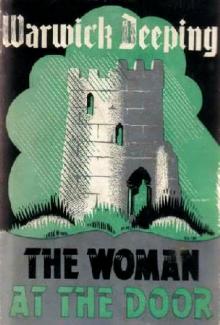 The Woman at The Door
The Woman at The Door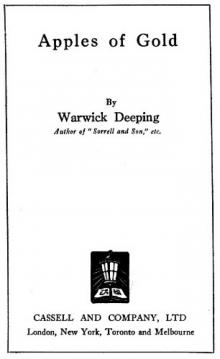 Apples of Gold
Apples of Gold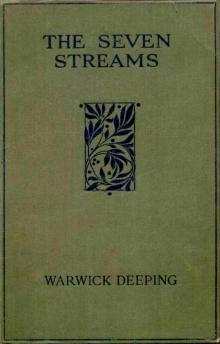 The Seven Streams
The Seven Streams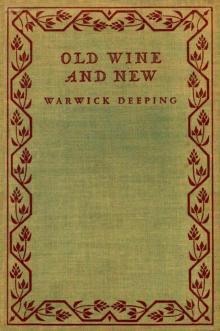 Old Wine and New
Old Wine and New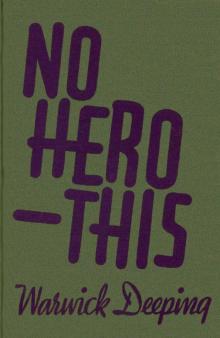 No Hero-This
No Hero-This Two in a Train
Two in a Train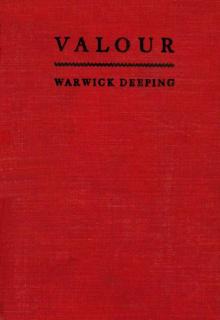 Valour
Valour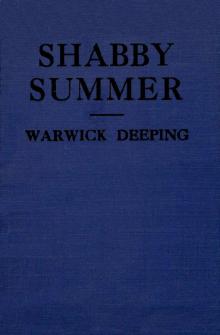 Shabby Summer
Shabby Summer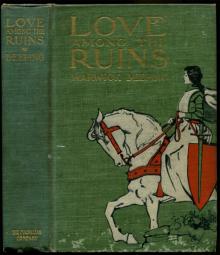 Love Among the Ruins
Love Among the Ruins The Short Stories of Warwick Deeping
The Short Stories of Warwick Deeping